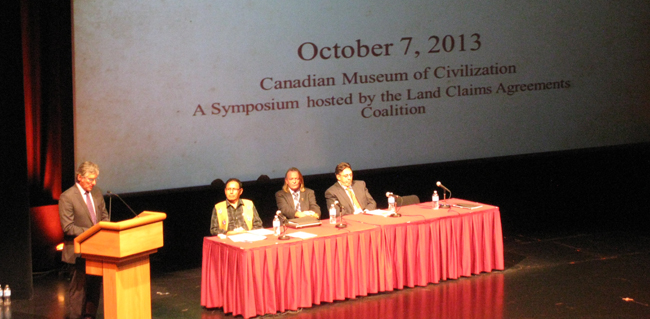Events show varied perspectives on Royal Proclamation

By Karl Hele
BOSTON/OTTAWA – “What exactly are we commemorating?” is the question I was left with after attending two distinct events surrounding the Royal Proclamation of 1763. One event in Boston, and the second in Ottawa both purported to commemorate a significant milestone in the history of North America yet each had an entirely distinct narrative.
The Oct. 4 event in Boston looked at the Proclamation within the context of 1763 British Imperial policy and as a movement toward revolution. I was the only presenter speaking from a First Nations and Canadian perspective – arguing that the document was alive and sickly in Canada both legally and politically.
The other participants concentrated on the document’s current validity in the history of the United States. Colin Calloway, a settler expert on Native-Newcomer relations in Early-American contextualized the Proclamation’s origins and intent while arguing that the American Revolution was more about “who would control access to Indian lands.” A focus on the American Revolution was to be expected, seeing as the event took place at Boston’s Old State House, a key site for colonial and revolutionary history.
Only a side note mentioned that the Proclamation was an important document that influenced U.S. Supreme Court decisions that cast Indian tribes beginning in the 1830s as “domestic dependent nations”.
The Oct. 7 event in Ottawa was entirely different. Hosted by the Land Claims Agreements Coalition, the focus was on the modern implementation the 1763 Royal Proclamation’s ethic. Settler historians, Colin Calloway and Jim Miller provided brief histories of various policies and treaty-making processes from the 1600s onward. The remaining speakers were lawyers and First Nations’ politicians, including Cree Grand Chief Matthew Coon Come, who solely focused on the Proclamation’s importance in the modern era.
When the speakers mentioned historic treaties, these documents served as a warning and a not-so-subtle joke about failures to avoid in modern treaties. Essentially the historic treaties were presented, as documents of the past with little relevance in the modern world – something as a historic treaty Indian I found in poor taste and annoying.
A controversial speech was delivered by the Minister of Aboriginal Affairs and Northern Development, Bernard Valcourt, who claimed that in Canada there was “no place for the Doctrine of Discovery” while maintaining that the central ideas of the Proclamation continued to guide Canadian Aboriginal policies, one of which is Crown sovereignty based on discovery! The speakers who followed, other than Ghislain Otis, a French-Canadian lawyer, failed to discredit this remark.
Dr. Karl. S. Hele is a citizen of Garden River First Nation and is a professor at Concordia University in Montreal.


